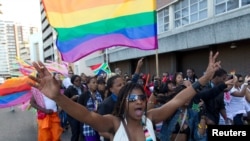South Africa’s epidemic of gender-based violence is especially harrowing for the nation’s sexual minorities, who say they regularly experience violence because of their gender expression and sexual identities. It’s a little-known part of what President Cyril Ramaphosa on Wednesday described as a “second pandemic” of violence in a nation already struggling with a viral pandemic.
Kirvan Fortuin’s body was a thing of wonder. It defied gravity, leaping, twisting and melting into graceful, often unbelievable, shapes. Fortuin, a dancer who identified as gender-fluid but used a male pronoun, was a sight to see in an industry dominated by women, and in a country where, activists say, toxic masculinity translates to the systemic abuse of non-male bodies.
Last week, Fortuin became one of those victims after he was stabbed to death in Cape Town. He had documented threats against his life for years. While the circumstances of his death are unusual — his assailant was a teenage girl — his friend Treyvone Moo says this is yet another example of chronic disrespect of those who don’t fit traditional gender roles.
“The reason why I'm so vocal about the protection of black femme bodies is because in our country specifically, we are seeing a rise in gender-based violence," Treyvone says. " It's clear that anything femme is seen as weaker. And when you are born in a cis-male body and present yourself in a more feminine or as a trans human, your body is as equally under threat. It is almost as if masculinity and the patriarchy sees you as an existential threat to the ideals that they've built over hundreds of years. And it's just not the case. All we want is to live. All we want is to exist.”
A survey by South African rights group Out found that half of black respondents knew people who had been killed because of their sexual orientation.
On Wednesday night, President Cyril Ramaphosa made his strongest statements yet on the nation’s unceasing wave of gender-based violence, calling it “a war being waged against the women and children of our country.” Statistics show that most victims are girls and women who conform to gender and sexual norms. More than 2,900 women were murdered in 2019, according to police statistics, which means, activists say, that a South African woman is killed approximately every three hours.
Activist and filmmaker Beverley Ditsie, who marched with other activists two years ago on the president’s office to demand action on gender-based violence, said she welcomed the president’s words and his acknowledgment of five of the movement’s 24 demands. However, she said, he gave no deadlines for action and made no attempt to address structural inequalities.
“It is amazing that an African man, a patriarchal man, stood up and actually said that, ‘OK. I acknowledge that this is a problem.’ The only problem here is that he was telling us what we've been telling him for years. It’s not a second pandemic — it’s a pandemic that's always been there. But actually, what are the actions? So, so far, it all felt very kind of lip service," she says.
Treyvone Moo wasn’t surprised at the president’s omission of sexual minorities.
“The president leaving us out of his speech is nothing new. Also, I don't think that there is enough spotlight put on characterizing gender-based violence through the lens of sexuality. So, looking at when gender-based violence is a hate crime, because I think that if anybody is attacking and killing a member of the LGBTQ community, it falls under a hate crime. The violence is not propagated only by gender, but it's fueled also by a hate and a disdain to our very existence," Treyvone says.
Activist Thokozani Ndaba leads the Ntethelelo Foundation, which supports survivors of abuse and sexual violence and also works with sexual minorities. We asked her how she feels about the wave of violence against women, girls and sexual minorities.
“I'm so tired of fighting. I'm so tired of talking. I'm tired of marching," she says. "I'm just tired of everything, because it just seems like it falls on deaf ears. Nobody's listening. You know, while we're talking and marching and doing all this and the government is not listening, women are getting killed, young girls are getting raped. …. I just believe that the court system itself is failing the women, and it's failing all women. Trans women suffer as women, too. Lesbian women suffer as women, too.”
That’s a hard truth that the nation’s LGBTQ community is seeing, again, this week. Fortuin was 28.




